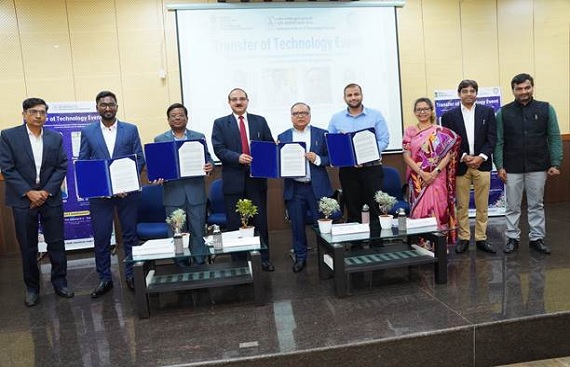Indigenous Conductive Ink Technology to Cut Import Dependency
By
siliconindia | Saturday, 11 January 2025, 04:23 Hrs

In a significant step towards reducing India's dependency on imports for advanced electronic materials, indigenous silver nanowire-based conductive ink technology was transferred to startups M/s Chematico Technologies Private Limited (IIT Ropar) and M/s Vasanthbala Functional Materials Pvt Ltd (NIT Warangal) at an event held at NIT Warangal.
The technology, developed under a project funded by the Ministry of Electronics and Information Technology (MeitY), Government of India, was a joint effort by Prof. Sarang Gumfekar of IIT Ropar and Prof. Shirish Sonawane of NIT Warangal. The global market for silver nanowire-based conductive ink is projected to exceed $16.87 billion by 2032, driven by increasing demand from sectors such as electronics, semiconductors, solar photovoltaics, and RFID. India currently imports conductive ink worth $15.72 million annually, primarily from the US, China, the Netherlands, the UK, and Taiwan.
The ink, commonly used to repair circuits on printed circuit boards, has diverse applications in flexible electronics, RFID tags, wearable devices, sensors, solar panels, and display technologies. Shri Bhuvnesh Kumar, IAS, Additional Secretary and CEO of UIDAI, MeitY, presided over the event, emphasizing the transformative potential of this indigenous technology for India’s semiconductor ecosystem.
Speaking on the occasion, Shri Kumar urged the startups to scale up manufacturing of silver nanowires and conductive ink to meet domestic and global demands. He lauded the efforts of the researchers and noted that the technology could significantly curb India’s reliance on imports for advanced electronic materials.
The event witnessed the presence of dignitaries including Smt. Sunita Verma, Group Coordinator, MeitY; Prof. Rajeev Ahuja, Director, IIT Ropar; Prof. Bidyadhar Subudhi, Director, NIT Warangal; and Shri Surendra Gotherwal, Scientist, MeitY.
This development aligns with India’s vision of fostering self-reliance and innovation in advanced manufacturing and electronics.
